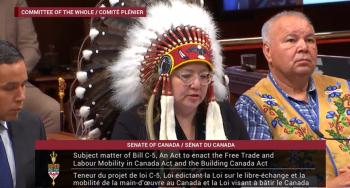Image Caption
Manitoba Métis Federation (MMF) President David Chartrand said his people want to do their part to protect Canada from the “mad man” to the south and his threats of tariffs.
Chartrand said Red River Métis understood the need for speed as Canada fast-tracks its response to the tariffs imposed by United States President Donald Trump on Canadian goods passing over the Canada/U.S. border.
Chartrand knows, he said, that if Canada’s economy collapses the Métis would be among those suffering the most from the resulting poverty and government cutbacks of programs that took decades to realize.
He told Canada’s Senate Committee of the Whole on June 16 that the federal government was asking Indigenous peoples to trust that the country would do right by them through future consultation and economic considerations if they were to support Bill C-5, the One Canadian Economy legislation.
“We are told that Indigenous partnership is at the heart of this legislation,” Chartrand said in his opening statement. “But it is not obvious where, when and how we will participate.” He called for clarity on this.
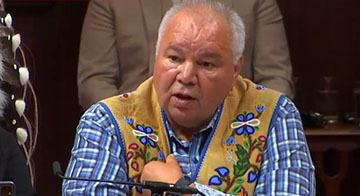
He said the government has signaled investments in clean and conventional energy, affordable housing and urban development, as well as defense and sovereignty.
“We will expect to be included as they roll out,” Chartrand said.
Moving the Canada - Red River Métis Self-Government Recognition and Implementation Treaty into force and settling the Métis land claim “should be recognized as a national interest that should also be fast-tracked as these would give us more tools to invest in these major projects.”
He said the Métis has land and shovel-ready projects, and “we are prepared to invest part of our future land claim settlement into these projects.
“We should not take lightly the threat that is coming from the south. The United States are looking at our natural resources," he said.
Chartrand said the Métis were willing to give Canada the trust they require on Bill C-5, despite a history of broken promises.
“We will support this legislation… Trump has started an economic war with Canada, to beat us and bring us down. The Red River Métis will kneel for no one.”
The MMF leader’s support of Bill C-5, however, was an outlier amongst the witnesses on the last panel of the day of the Senate’s review of “One Canadian Economy: An Act to enact the Free Trade and Labour Mobility in Canada Act and Building Canada Act.”
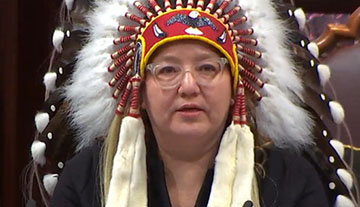
Assembly of First Nations (AFN) National Chief Cindy Woodhouse Nepinak and Natan Obed, president of the Inuit Tapiriit Kanatami (ITK), instead were pumping the brakes on the speed at which Prime Minister Mark Carney is driving the legislation through Parliament.
Carney promised Canadians that the legislation that would remove federal internal trade barriers between the provinces and territories and diversify trade beyond the U.S., that would advance the building of national interest projects and increase Canadian productivity and competitiveness, would be completed by Canada Day, July 1.
Woodhouse Nepinak called on Canada to “slow down. Take the summer” to do a proper job of consultation with First Nations, a requirement set out by decades of jurisprudence.
“We know how it feels to have Trump at our border. Let’s not do that and have Trump-like policies. Let’s take the time and do things properly. That will make this country a better place,” she said. The rushed legislation was ignoring judicial guidance on consultation, putting rights at “substantive risk”.
“Bill C-5 is one of the most significant federal bills First Nations have had to deal with in recent years,” she said. The powers of C-5 are significant and a risk to many collective rights of First Nations, under their own laws, the Constitution and international law.
Canada has obligations to deep consultation and free, prior and informed consent as affirmed by King Charles III, himself, in the Throne Speech on May 27, she said. Instead, Canada has given First Nations an “unreasonable tiny window” of time— just seven days on a limited outline of the bill—to consider, engage, and respond to the proposed legislation.
Consultation is not the Crown simply listening to a five-minute presentation and then going away and deciding on its own without dialogue, said Woodhouse Nepinak.
Additionally, she pointed out that very few rights holders would be able to speak directly to Parliament or have time to address the Bill or share legal analysis and concerns on key issues because of emergencies outside of their control.
Leaders whose communities are impacted by wildfires and focused on getting their people to safety through evacuations are just “out of luck”, she said, to be able to respond to the bill in the short timeframe given.
“We are extremely alarmed with the many aspects of Bill C-5,” said the national chief.
“In short, the honour of the Crown is not being upheld.”
Woodhouse Nepinak referred multiple times during the testimony to the massive infrastructure gap in First Nations that she said should be considered of national interest, but it was learned that such projects don’t meet the standard as outlined in C-5.
She said she wishes Canada was talking about fast-tracking school construction on First Nations, clean water infrastructure, high-speed internet and all-season roads, especially topical as First Nations try to evacuate from this season’s wildfires.
“Unfortunately, we are not here for that.”
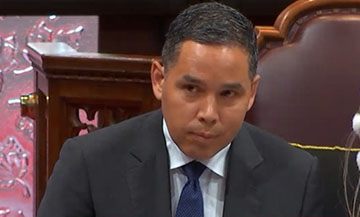
To open his remarks, primarily focused on the Building Canada Act, Obed first made an observation.
“It has been Canada’s weakness for patting itself on the back for being a great champion of Indigenous peoples and an upholder of the rule of law and respecter of Indigenous people’s rights at the same time acting very differently through its legislation and its practice.”
He said it was not born out of ignorance but “a clear decision on whose rights matter and whose don’t, and how to get to an end goal that makes Canada feel good about itself while still trampling on the very rights that it says it upholds.”
Obed said that while Bill C-5 is short, the proposed legislation is extremely complicated, giving the government wide-ranging powers. He urged Canada to take the time to seek the opinion of the Inuit on possible infringements on their “legally enforceable rights.”
Obed reminded the senators that ITK member groups have constitutionally protected modern treaties with the Crown and their collective territory, which they control outright or jointly manage, represents more than one-third of Canada’s land mass and three quarters of the shoreline.
The unintended consequences of rushing to pass legislation without proper consultation with Inuit could see the legislation before the courts, causing national interest projects to become delayed, creating instability and, ultimately, undermining investor confidence and slowing the pace of development.
Arctic development is much needed to achieve economic and social parity with other Canadians, said Obed. The Inuit have identified 70 major infrastructure projects consistent with the government of Canada’s priorities, yet the One Canadian Economy Act is not inclusive of the Inuit, he said.
Respect and equity must be hallmarks of the new legislation. This includes respect for Inuit rights and Inuit/Crown treaties, which establishes obligations of a relationship that benefits Inuit and all Canadians, said Obed.
“We would like to see the legislation address the economic alienation that we have experienced.”
He warned that Canada should not repeat significant past harms experienced by Inuit through former government Arctic expansion and development policies. What is wanted is a secure partnership with Canada where prosperity is built while rights are upheld, he said.
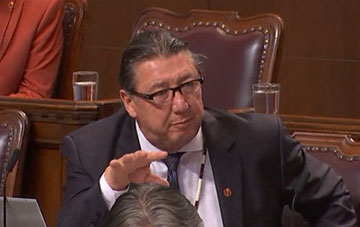
A number of senators, including Paul Prosper, formerly an AFN regional chief for Newfoundland and Nova Scotia, asked for clarification for the public record on what ‘meaningful consultation’ is. Senator Pat Duncan said there were multiple interpretations of what consultation means across the country.
Chartrand said that was going to be the Achillies heel of the C-5 legislation. Sometime consultation takes years and years and now Canada wants to shorten those complex discussions, especially with the environmental component, to two years.
All involved need to be certain what consultation looks like, especially industry whose investments might go up in smoke if things are not done correctly, Chartrand said. If Canada wants consultation shorter, then there should be clarity on what defines consultation.
He said the important thing for the Métis is to protect themselves when getting to the consultation table with the same education and skill set, expertise, lawyers and advisors “that we can afford to match the government or private sector side.”
Proponents have, in the past, tried to sidestep the Métis government by consulting with a small village or the mayor of a small town who they say is Métis, touting that as consultation. Well, they don’t represent Métis people, Chartrand said.
“We’ve been burnt a lot of times on this issue. Hurt a lot of times.”
National Chief Woodhouse Nepinak zeroed in on the standard of free, prior and informed consent.
Free means that the process of consulting must be free of intimidation, coercion, and other forms of duress, she said.
Prior means consultation and cooperation must take place before decisions are made, not after a bill is passed and a project pre-approved in advance of actual consultation and dialogue about consent.
Informed means Indigenous peoples must have access to all relevant information to make their own decisions. Indigenous peoples must have the time and opportunity to reach an informed conclusion based on their own forms of decision making.
They must be provided all information on major projects and have access to proper assessment of potential consequences, such as an environmental and social impact assessment and possibly a human rights assessment for collective rights and individual human rights. Translation into an Indigenous language may also be required.
“Conversations are not always easy, but when we don’t even have a table to come to and talk… or enough time… I think we have to do things better in our country,” said Woodhouse Nepinak. “Ramming something through in seven to 14 days is not the Canadian way.”
Canada should follow its own rules and laws, she said. “Let’s not step years back.”
Senator Brian Francis (Mi'kmaw/Lnu) said one of his concerns with Bill C-5 is that it would grant Cabinet for at least five years “sweeping authority” to fast-track projects of national interest. It creates a framework in which Indigenous rights are treated as optional or subordinated. He asked if the witnesses were concerned that the bill risks giving current and future governments the legal latitude on major projects without upholding their legal duty to consult or obtain consent with Indigenous Nations.
Obed noted there is no non-derogation clause in C-5. Such a clause inserted into legislation means that it is not to diminish existing rights or laws, ensuring the legislation won’t negatively impact Indigenous rights.
“I would hope that the government wouldn’t imagine that it could ignore our constitutional rights based on a piece of legislation… If that is its intent there will be incredible opposition in all forms from those affected.”
The challenge with this bill, he said, is Inuit want to support it. They are in agreement on the objectives.
“We want to stand with all other Canadians… but the words that are meant to be inclusive of Inuit, or of Indigenous peoples broadly, seems like they’re just thrown around as if they don’t have meaning. And the problem is they have incredibly deep meaning within the fabric of the Constitution, the Supreme Court, and the legislative status of these terms in Canada. And that’s where, I think, we are running afoul of our shared intent.”
Chartrand reiterated that the trust being asked of Indigenous peoples to give up for now the process of consultation is being exacerbated by the threat to Canada’s economy from the United States.
“Time may not be there... We are under threat. We can’t take this rhetoric of the mad man from the south lightly. His actions are crumbling his own economy…It’s going to get worse instead of better… Time is not on our side.”
President Trump was in Canada on the day of the Senate committee meeting to attend the G7 Summit in Alberta. In a press conference with Prime Minister Carney, Trump said he was a “tariff person”.
He said the primary focus of talks would be trade generally, including trade with Canada. He rejected the premise that there was a hold-up on a deal with Canada that would relieve the current trade situation, calling it a matter of competing concepts.
“I have a tariff concept. Mark has a different concept, which is something that some people like… I’m a tariff person. I’ve always been a tariff person. It’s simple. It’s easy. It’s precise. And it just goes very quickly.” Canada’s idea is more complex, he said.
The president left the summit early to focus on the Israel-Iran conflict that exploded internationally in the days leading up to the G7. Carney and Trump agreed to pursue a deal in the next 30 days.
Trump’s comments on Air Force One after he left the summit, however, throws some cold water on that plan. He was asked again if Canada should become the 51st state.
“I think it’s a much better deal from Canada, but, you know, it’s up to them. They’re going to have to pay a lot of tariffs on things. They’re going to have to pay a lot of money for the (Golden) Dome; they want to be a part of it.”

